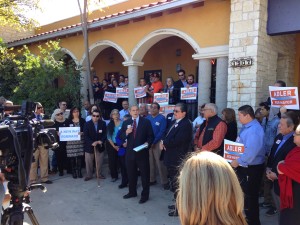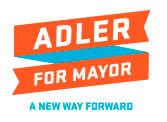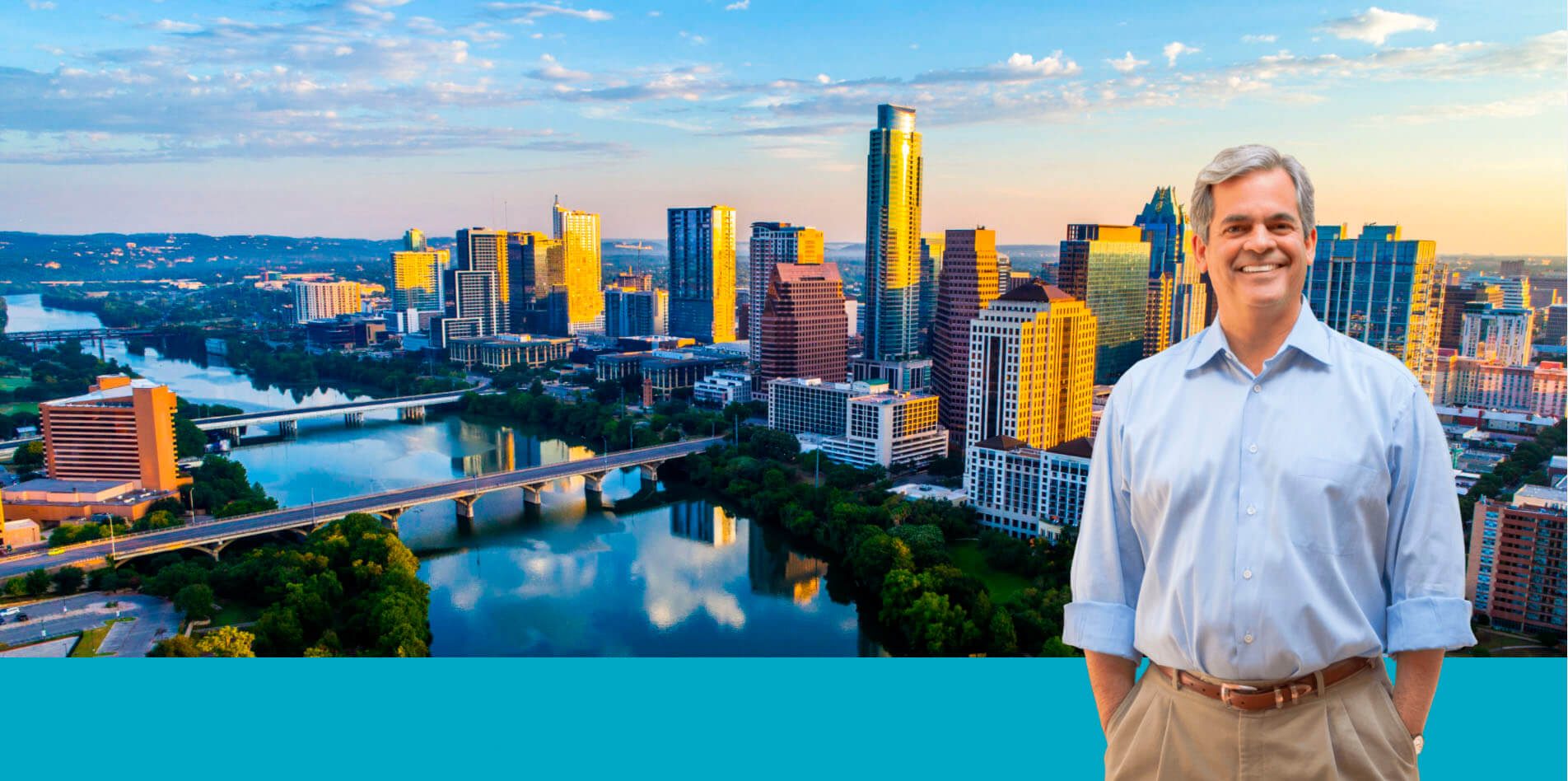
Austin needs to prioritize celebrating and supporting our Latino/Hispanic community. Many of my policy priorities as mayor reflect key recommendations of the Hispanic Quality of Life Initiative Report and the related Resource Advisory Commission. During my campaign, I have produced and posted several comprehensive policy papers that address key priorities in the report, especially in the areas of education and affordability. The City needs to focus more on education and youth services, affordability, housing, health, transportation, economic development, middle class job creation, expansion and training, and on cultural arts and civic engagement.
Immediate Action on Austin’s Affordability and Housing Crisis
Median homeowners have seen a 58 percent increase in property taxes and over 60 percent increase on their water and energy rates since 2006.[1],[2],[3] Average renters have seen a $380 per month increase since 2009.[4] Austin’s poor population grew by 80 percent from 126,375 in 2000 to 230,437 in 2012.[5] Forty-five percent of our Latino/Hispanic children live in poverty.[6] Austin’s metro area has a home ownership rate roughly 20 percent below the rate for all of Texas.[7] As costs of living continue to rise, families are faced with having to leave the city they call home. As Mayor, I will push for the following policies to address this inequality and drag on opportunity.
- A homestead exemption for the City of Austin that will give homeowners and their families immediate relief to their skyrocketing property tax bills. As 80 percent of all homeowners in this city live in houses valued at less than $400,000, this will provide rapid relief to those hard-working middle class families.[8],[9]
- Fairer utility costs, first by reforming the drainage fee that City Council has unfairly and illegally charged to renters. Reform the operating models at the utilities so that ratepayers do not face ever increasing costs despite using less energy and water through conservation over time. This is not a sustainable model for our future and it needs to change
- Reform the permitting process and the land development code that are hindering the construction of both affordable and middle-income housing. We need to better provide housing supply so as to meet demand so that housing costs can decrease.
- We must preserve affordable housing stock throughout the city, especially in gentrifying neighborhoods.
Making Education a Top Priority
One of my highest policy priorities is to expand access and quality of education throughout the City of Austin. There is more our city government can do to improve the Latino/Hispanic community’s access to quality education at the pre-kindergarten, public school and post-high school level. However, only 17 percent of Latinos in the Austin metro area hold bachelor’s degrees or higher while demographic trends show that in twenty-five years, Austin will be majority Hispanic. [10],[11] We absolutely must be doing everything we can to ensure that our Latino/Hispanic residents and their children are receiving every opportunity for advancement and success. If we fail in this very crucial mission, Austin as a city cannot prosper. We must work toward:
- New Education Outreach Coordinator in the mayor’s office to work with the Joint Committee on education, with all citywide school boards, Austin Community College and the regional universities, nonprofits focused on educational services, private investment from major employers, philanthropy, and the Greater Austin Hispanic Chamber of Commerce.
- Robust expansion of high-quality pre-kindergarten to all Austin children: In AISD, over 60 percent of total students are considered economically disadvantaged, many of them Hispanic.[12] Citywide, over 45 percent of Hispanic children under the age of eighteen live in poverty and this continues to get worse.[13] As poverty has a direct impact on the quality and success a child will have in school and thus their future, we have to do far more to improve this situation.
- We must reduce the number of homeless youth and increase youth employment and internships.
- Seek to reform state law to receive fairer and adequate state funding for our schools but, in the meantime, use schools as community centers to deliver city wraparound services. Work creatively with City of Austin school districts on these and possible coordinated financing efforts.
Economic Development Reflecting our Values
We need to be focusing on economic development and job training for Latino/Hispanic workers and communities. Sixty percent of Latinos 25 years of age and older have no postsecondary education. Latino/Hispanic-owned small businesses have average sales per company of $740,000 compared to Anglo owned companies with annual average sales of $2 million.[14] I have proposed to change our focus and reform our economic incentives programs.
- Increase focus on small and local businesses and creating, expanding, and training for middle class jobs for people who live here, expanding partnerships between private businesses, the City of Austin, Workforce Solutions Capital Area and other job service providers and Austin Community College.
- It is in our city’s interests to ensure that Latino/Hispanic-owned businesses are receiving the support they need to succeed and that Latino/Hispanic workers are both gaining the skills they need and are being matched with companies that are ready to hire them and making this a focus of any incentives.
- We have too many people working for the City of Austin at or near the minimum wage. We should work to raise pay scales and encourage training for city employees so as to provide advancement and greater career opportunities. We must also work with the State to raise the minimum wage.
Preserving Latino/Hispanic Cultural Arts and Promoting Civic Engagement
As referenced in the Hispanic/Latino Quality of Life Report, our community cannot fully experience a high quality of life if it does not include and take advantage of the talents of all communities and have a thriving and diverse cultural arts component.
- I will work to ensure that the Emma S. Barrientos Mexican American Cultural Center continues to receive the funding it needs for current and planned operations, enhanced programming, and future phases. As a city filled with culture and festivals, it is imperative that our arts reflect the diversity among our people. As a community, we need to know and celebrate our Mexican-American history.
- I intend to ensure that the Latino/Hispanic community has a strong voice in our city government and is civically engaged. We must preserve and protect diversity in this city, and the first place to start is in local government. We need to emphasize cultural competency in city government. Appointments to our boards and commissions, and staffing in the mayor’s office, must reflect the diverse makeup of our city, ensuring Hispanic advocates and policy specialists.
Access to Quality Health Care
Latinos are the highest group of uninsured. They are more likely to be obese than non-Latinos. Diabetes rates of Latino adults exceed health benchmarks.
- We need health programming focusing on health disparities, especially in chronic care.
- Support health initiatives for the Rundberg and other areas of greatest need.
- We must ensure that the new medical school and teaching hospital, and perhaps a re-purposed Brackenridge Hospital, focus on and improve the health and well being of the surrounding community in holistic ways.
Transportation
With the failure of Capital Metro’s and the City Council’s transportation bond package, we cannot wait and must immediately develop a plan to address congestion that will work and be approved. There is increasing dispersion of Latinos/Hispanics and flight to outlying areas and this creates roadblocks for reasonable and affordable transportation options to places of employment.
- We need to expand roadway infrastructure, deal with the most congested intersections and choke points, expand use of continuous movement intersections, increase ridership and effectiveness of our transit system, expand and connect trails, and move forward with a long range mass transit solution.
- But dealing with long-term traffic congestion is also about how and where we live. It is in part a land planning issue. We cannot just buy or build roadway infrastructure and get out of this challenge. We need to expand staggered work hours and telecommuting. Austin in 20 years should have a mid-town or other area(s) that provides an urban choice to existing downtown so that not everyone wanting that kind of option has to be in or come through the existing downtown.
- We need a better sidewalk system in all neighborhoods.
Steve Adler’s Experience Standing up for Latino/Hispanic and Minority Communities:
- I began my legal practice as a civil rights attorney and defended women and Hispanic workers that had faced workplace discrimination. I continued this civil rights work, among other ways, as chair of the Anti-Defamation League, (e.g., helping to start the No Place For Hate program now in 300 Central Texas schools).
- Served as a Board Member to Breakthrough Austin, an organization that recruits sixth grade students who would be the first in their family to attend college and mentors them through the education process.
- Board Member with GEN Austin (Girls Empowerment Network), an organization that mentors middle school age girls to make good choices. (My wife and I have raised three strong, successful and independent women.)
- Served as Chief and Staff and General Counsel to Senator Eliot Shapleigh, D-El Paso, TX. Working in the Legislature for eight years, I fought for economic engines in communities that did not already have them, helped close down the harmful Asarco power plant that had polluted El Paso air for decades, and learned and battled the state formula for funding public schools and fought for teacher pay increases.
Citations
[1] Travis Central Appraisal District, Public Information Request
[2] City of Austin approved tax rates, FY2006-FY2015 Budgets
[3] Comparison of rise in utility rates to average home as reported in FY 2006 and FY 2015 approved City of Austin budgets
[4] Rent Trend Data in Austin, Texas, Rent Jungle (rentjungle.com)
[5] Business Insider, The 15 US Cities Where Poverty is Soaring Fastest (businessinsider.com)
[6] City of Austin, Planning & Development Review Department, Selected Demographic Trends in Austin
[7] Business Insider, The 15 US Cities Where Poverty is Soaring Fastest (businessinsider.com)
[8] Travis Central Appraisal District 2014 Tax Roll
[9] Williamson Central Appraisal District 2014 Tax Roll
[10] Civic Analytics, Austin: A Theory of Everything, How & Why Austin is Changing and What We Should Do About It, October 15, 2014
[11] City of Austin, Planning & Development Review Department, Selected Demographic Trends in Austin
[12] Austin Independent School District, AISD Fact Sheet 2013-2014 School Year (austinisd.org)
[13] City of Austin, Planning & Development Review Department, Selected Demographic Trends in Austin
[14] City of Austin, Hispanic/Latino Quality of Life Resource Advisory Commission

